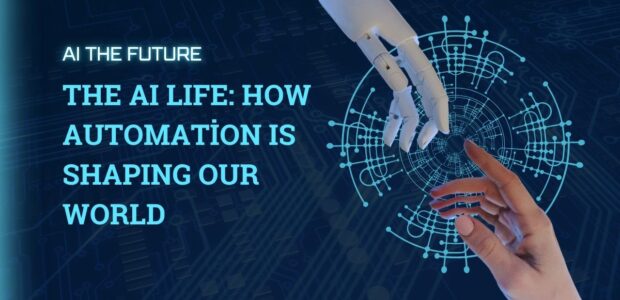The AI Life: How Automation Is Shaping Our World
In the not-so-distant past, automation was the stuff of science fiction. Fast forward to 2025, and artificial intelligence (AI) is no longer futuristic—it’s fully integrated into our everyday lives. From how we work and shop to how we travel and manage our health, automation is quietly revolutionising modern life.
🧠 AI in Everyday Life
Whether you realise it or not, AI touches nearly every part of your day. Smart assistants like Alexa and Google Assistant manage schedules, turn off lights, or play your favourite playlist. AI filters your social media feeds, recommends your next Netflix binge, and even auto-corrects your texts.
In your home, smart thermostats learn your temperature preferences, vacuum robots clean without instructions, and fridges can suggest recipes based on what’s inside.
What used to require manual decisions is now handled automatically—saving time, energy, and often money.
🏥 Revolutionising Healthcare
AI is reshaping how we detect, treat, and even predict health conditions. Algorithms can analyse X-rays faster than radiologists, virtual health assistants offer mental health support, and wearable devices track everything from sleep patterns to heart irregularities.
Some hospitals now use AI to predict patient deterioration before symptoms arise—enabling proactive treatment rather than reactive care. Telehealth services, powered by machine learning, offer instant consultations, making healthcare more accessible globally.
🛍️ Retail and Customer Experience
Have you noticed how online shops know exactly what you want? AI algorithms track behaviour and preferences to suggest the perfect item at the perfect time.
Retailers use chatbots to answer customer queries 24/7, while inventory systems automatically restock products based on predictive demand. Some shops now operate with no cashiers—customers simply walk out with their purchases, and AI takes care of the billing.
🧑💻 The Automated Workplace
Automation isn’t just taking over routine jobs—it’s redefining work entirely. AI tools now write reports, summarise meetings, generate code, and even design ads. In 2025, many businesses use AI copilots to boost productivity, leaving human employees to focus on creative or strategic tasks.
However, this rise in automation raises valid concerns about job displacement. While some jobs become obsolete, new roles emerge—like prompt engineers, AI trainers, and ethics consultants. The workforce is rapidly evolving, demanding upskilling and adaptability.
🚗 Mobility and Smart Cities
Self-driving vehicles are no longer in beta—they’re actively transporting goods and people in major cities. AI traffic systems reduce congestion, autonomous drones deliver parcels, and public transport schedules are optimised in real-time.
Smart cities use AI to manage electricity, water, and emergency services with efficiency that wasn’t possible a decade ago. The goal? Convenience, cost-efficiency, and sustainability.
⚖️ Ethical Concerns and Human Identity
With AI influencing decisions from who gets a loan to what news we read, ethical concerns have become central. Bias in algorithms, data privacy, surveillance, and the risk of deepfakes all demand serious attention.
More fundamentally, society is asking: What does it mean to be human in an AI-powered world? As machines mimic creativity, emotion, and intelligence, the boundaries between artificial and authentic are blurring.
🔮 Looking Ahead: Human-AI Collaboration
Rather than fearing AI, many experts argue for a collaborative future—where AI supports human strengths rather than replaces them. Think of AI not as a rival, but as a tool that enhances human potential.
From personalised education to sustainable farming, AI can help us solve global challenges—if we use it wisely.
💡 Final Thoughts
The AI life is here, quietly and powerfully reshaping our world. While automation brings comfort and efficiency, it also brings responsibility. The key in 2025 and beyond is to embrace the benefits of AI while remaining vigilant about its risks.
We must lead technology—not be led by it.


